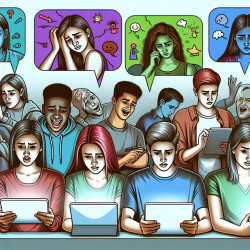The COVID-19 pandemic has significantly impacted mental health worldwide, emphasizing the need for accessible and effective mental health services. The recent research article, "The Usability, Feasibility, Acceptability, and Efficacy of Digital Mental Health Services in the COVID-19 Pandemic: Scoping Review, Systematic Review, and Meta-analysis," provides comprehensive insights into the effectiveness of digital mental health interventions during this challenging time.
This blog post will explore the key findings from the research and discuss how practitioners can improve their skills by implementing these outcomes or conducting further research.
Key Findings from the Research
The study reviewed 65 studies involving 67,884 participants across 18 countries, examining various digital mental health services such as:
- Web-based programs
- Videoconferencing platforms
- Smartphone apps
- SMS text messaging
- Social media
- Hotline and telephone calls
- Robotic telemedicine and virtual reality (VR)
The research aimed to understand the usability, feasibility, acceptability, and efficacy of these services. Here are some key takeaways:
- Usability: High usability scores were reported for smartphone apps and web-based programs, indicating that users found these platforms easy to navigate and use.
- Feasibility: Digital interventions showed high completion and retention rates, particularly for web-based programs and videoconferencing platforms, demonstrating their practicality in real-world settings.
- Acceptability: Participants expressed high satisfaction with digital mental health services, with many willing to continue using these services and recommend them to others.
- Efficacy: Digital mental health interventions were associated with significant reductions in depressive and anxiety symptoms, showcasing their effectiveness in addressing mental health issues during the pandemic.
Practical Applications for Practitioners
Based on these findings, practitioners can take several steps to enhance their digital mental health services:
- Adopt User-Friendly Platforms: Prioritize platforms with high usability scores, such as smartphone apps and web-based programs, to ensure a seamless user experience.
- Focus on Feasibility: Implement strategies to maintain high completion and retention rates, such as providing clear instructions and offering ongoing support.
- Enhance Acceptability: Gather feedback from users to continually improve the services and ensure they meet the needs and preferences of the target population.
- Measure Efficacy: Regularly assess the impact of digital interventions on mental health outcomes to ensure they are effective and make necessary adjustments based on the findings.
Encouraging Further Research
While the current research provides valuable insights, there is a need for further studies to explore long-term outcomes and the effectiveness of digital mental health services across diverse populations and settings. Practitioners are encouraged to contribute to this growing body of knowledge by conducting their research and sharing their findings with the broader community.
To read the original research paper, please follow this link: The Usability, Feasibility, Acceptability, and Efficacy of Digital Mental Health Services in the COVID-19 Pandemic: Scoping Review, Systematic Review, and Meta-analysis.










